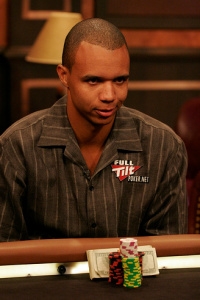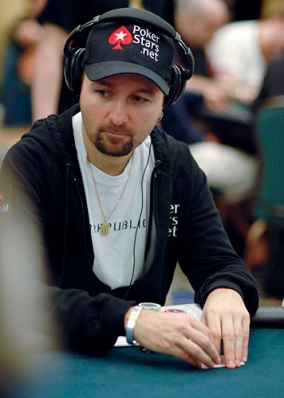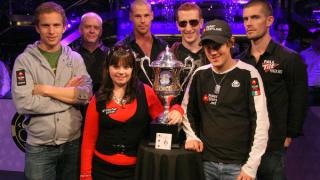 |
| Laurent Tapie |
First appeared on PokerStrategy.com
When I first heard about the proposed $30 million guaranteed International Stadium Poker Tour (ISPT), I doubted whether it was real. Then last week,
PokerStrategy confirmed in an exclusive interview with Laurent Tapie that it was indeed going ahead.
Sadly, I am still as sceptical as I was before.
I hate negativity, and I love stories of people proving doubters wrong in the face of massive adversity, but regrettably, I have to be one of the many who points their finger and doubts. If I am wrong, I will be delighted to be one of the footnotes in history who were made to look foolish, because this could be great for poker, but I just cannot see this event happening the way it’s currently planned out.
To recap, the ISPT is going to take place at Wembley Arena in September 2012, over five days. It will start with 20,000 to 30,000 players in the stadium seats playing shootout poker on electronic pads. When the field is reduced to 3,000 players, play will recommence live on the pitch, all the way up to the final table. The prize pool is said to be guaranteed at $30 million.
Bad Timing
My first concern is largely around the climate the ISPT is being created in. Not only is online poker currently in the biggest decline since its inception, the people behind the tour are currently embroiled in the biggest scandal the game has ever seen.
Now of course, they were not in any way to blame for what previously happened at Full Tilt, and are currently looking like being the potential knight in shining armour about to rescue the players.
But until that happens, are the poker public going to get behind this event? It seems very premature to announce such an event when a significantly more important deal for the poker economy is yet to take place?
The Tapies may want to keep Full Tilt and the ISPT entirely separate, but the poker community is inevitably going to associate one with the other. Unless they can rescue Full Tilt to the player’s satisfaction, this new enterprise will not be taken seriously.
Then let’s look at the sheer scale of the event. Even though the issue of where to put 3000 tables has been addressed by the use of electronic pads, do we really expect 30,000 players to buy in/satellite in for $1000?
The previous European record is 1765 and in Vegas its 8773. Can we really expect those records to be smashed by such high margins by an unproven event? A brand as reputable as the WSOP has not been able to break the record since 2006 after all.
Questionable Partners
Many of the tickets will be won online, but where? Such an ask needs a big, and I mean huge, room to take on the task of hosting qualifiers, and the only one that comes close is PokerStars. In fact, I don't even think the mighty PokerStars is big enough for such a task right now, nor can I see them getting involved with this.
No other room, or combination of rooms, has a hope of hosting this many qualifiers (especially as we have to assume US players won’t be able to qualify online), especially not a resurrected Full Tilt.
The only real way an online qualification campaign would be viable would be if all the major rooms held qualifiers, like the way in which WSOP satellites are held. That is not beyond the realms of possibility, but this takes me onto my next criticism.
So far all the partners involved have
nothing to do with poker. That is never a good sign for me, as most mainstream advertisers wouldn’t touch poker with a 10 foot pole. I'd feel much more comfortable if a big online room or poker brand had been associated with it, but the absence of any poker related partner so far is very worrying - both if some have been approached and said no, or if they were never approached in the first place.
One of the partners is Orange, who are said to be providing the 30,000 tablets and broadband needed to facilitate such an event. Surely that is going to be ridiculously expensive? Whether it’s an existing tablet like an iPad, or a specially made one, when you factor in the broadband and insurance, surely the cost would actually be something close to $1,000 per unit?
I am no expert here, so correct me if I am way off with my figures, but that cost alone will match the prize pool. Even if the cost is closer to $100 per unit, that is effectively the rake accounted for in just one expense, before we even factor in the cost of hiring the Stadium.
 |
| Site of the ISPT event: Wembley Stadium in London |
That is not the only logistical concern I have for the event. Sitting in the stands of a stadium like Wembley for five days is going to be pretty uncomfortable, especially if it is cold as London often is. I daren't even speculate what would happen if it rained.
Laurent Tapie has told that the prize pool has already been escrowed, which is a good sign. But other than that, there are still a lot of question marks. The date has already changed from May to September, I spoke to the press officer at Wembley who informed me the event is not 100% confirmed yet, and Tapie said in his interview that they still haven’t acquired the necessary gaming licenses to go ahead.
The prize pool may be guaranteed, but this event is far from guaranteed to go ahead.
I hope I am wrong, and at the moment it starts to appear that I am wrong, I will gladly eat humble pie and become the biggest fan of the ISPT, laughing at what a fool I was to ever doubt it. But until then, I just find myself asking too many questions, at a time when poker consumers need more certainty than ever before, to take the event seriously.
follow @Barry_Carter on Twitter.






